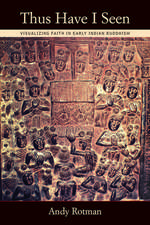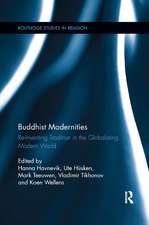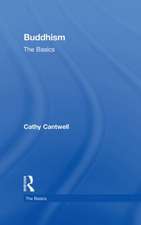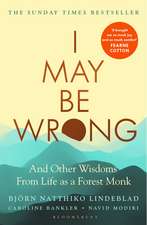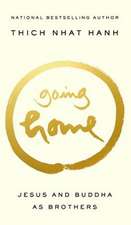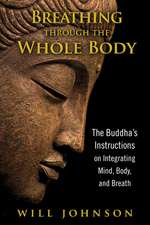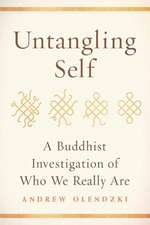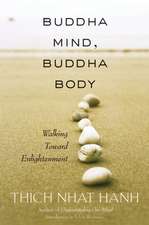Moments of Mindfulness: Daily Inspiration
Autor Thich Nhat Hanhen Limba Engleză Hardback – 4 noi 2013
This beautifully designed gift book contains many of the best-loved inspirational quotations and passages from Zen master Thich Nhat Hanh. Basic meditation instructions and messages of peace, love, insight, understanding, and compassion accompany two-color illustrations throughout, with blank pages for personal reflections and inspiration. Moments of Mindfulness is a perfect journal for spiritual exploration.
Moments of Mindfulness is intended to be used as a personal notebook or to simply read for everyday inspiration, and to help bring mindful practices and reflection to daily life. With illustrations by Jenifer Kent, beautiful details and design, it makes a wonderful gift.
Moments of Mindfulness is intended to be used as a personal notebook or to simply read for everyday inspiration, and to help bring mindful practices and reflection to daily life. With illustrations by Jenifer Kent, beautiful details and design, it makes a wonderful gift.
Preț: 82.38 lei
Preț vechi: 99.95 lei
-18% Nou
Puncte Express: 124
Preț estimativ în valută:
15.76€ • 16.37$ • 13.15£
15.76€ • 16.37$ • 13.15£
Carte disponibilă
Livrare economică 04-11 martie
Livrare express 15-21 februarie pentru 35.97 lei
Preluare comenzi: 021 569.72.76
Specificații
ISBN-13: 9781937006464
ISBN-10: 1937006468
Pagini: 140
Ilustrații: Two-color art throughout
Dimensiuni: 112 x 168 x 15 mm
Greutate: 0.2 kg
Editura: Parallax Press
ISBN-10: 1937006468
Pagini: 140
Ilustrații: Two-color art throughout
Dimensiuni: 112 x 168 x 15 mm
Greutate: 0.2 kg
Editura: Parallax Press
Cuprins
Please Call Me by My True Names by Thich Nhat Hanh
Thich Nhat Hanh: Monk, Zen Master, Poet, and Peace Activist
Thich Nhat Hanh’s Teaching and the Practice of Mindfulness
The Seven Miracles of Mindfulness
Mindfulness as Energy
Living in the Present Moment
Eating and Drinking Mindfully
Breathing Mindfully
Walking Mindfully
Mouth Yoga or How to Smile at Yourself
Developing Understanding and Compassion
About Plum Village
Bibliography
Thich Nhat Hanh: Monk, Zen Master, Poet, and Peace Activist
Thich Nhat Hanh’s Teaching and the Practice of Mindfulness
The Seven Miracles of Mindfulness
Mindfulness as Energy
Living in the Present Moment
Eating and Drinking Mindfully
Breathing Mindfully
Walking Mindfully
Mouth Yoga or How to Smile at Yourself
Developing Understanding and Compassion
About Plum Village
Bibliography
Notă biografică
Born in Hue, Vietnam, Thich Nhat Hanh is a Buddhist monk, poet, scholar, and human rights activist. In 1967, he was nominated by Martin Luther King, Jr. for the Nobel Peace Prize. He is author of more than one hundred books, sixty in English. Previous best selling books include Being Peace and Happiness. He lives at Plum Village, his meditation center in France, and travels worldwide, leading retreats on “the art of mindful living.”
Illustrator:
Jenifer Kent makes drawings inspired by systems and patterns of movement and growth. She received her BFA from Rutgers University and her MFA from Mills College. She lives in Petaluma, California and teaches at San Francisco University High School. Her work has been exhibited nationally and is represented by Dolby Chadwick Gallery in San Francisco.
Illustrator:
Jenifer Kent makes drawings inspired by systems and patterns of movement and growth. She received her BFA from Rutgers University and her MFA from Mills College. She lives in Petaluma, California and teaches at San Francisco University High School. Her work has been exhibited nationally and is represented by Dolby Chadwick Gallery in San Francisco.
Extras
Mindfulness as Energy
Thich Nhat Hanh writes: “We have the ability to work wonders. If we live mindfully in everyday life, walk mindfully, are full of love and caring, then we create a miracle and transform the world into a wonderful place.”
For Nhat Hanh, mindfulness is a form of energy. He compares mindfulness to a seed, which, when watered, grows into enlightenment, understanding, compassion, and transformation. The more we practice mindfulness, the stronger this seed will grow.
Living in the Present Moment
Thich Nhat Hanh writes: “Our true home is the present moment. If we really live in the moment, our worries and hardships will disappear and we will discover life with all its miracles.”
Real life can only be found and touched in the here and now. This is because the present moment is the only moment we can actually influence. The past is over and the future has not yet arrived. Since the present moment is the only real moment for us, we can always return here to get in touch with the wonders of life.
Thich Nhat Hanh regards living in the moment as the key requirement for one’s own freedom. He says, “As long as we are consumed with our everyday problems—distress, regrets about the past or constant worries about the future—we cannot be free people; we are not able to live in the here and now.”
Thich Nhat Hanh writes: “We have the ability to work wonders. If we live mindfully in everyday life, walk mindfully, are full of love and caring, then we create a miracle and transform the world into a wonderful place.”
For Nhat Hanh, mindfulness is a form of energy. He compares mindfulness to a seed, which, when watered, grows into enlightenment, understanding, compassion, and transformation. The more we practice mindfulness, the stronger this seed will grow.
Living in the Present Moment
Thich Nhat Hanh writes: “Our true home is the present moment. If we really live in the moment, our worries and hardships will disappear and we will discover life with all its miracles.”
Real life can only be found and touched in the here and now. This is because the present moment is the only moment we can actually influence. The past is over and the future has not yet arrived. Since the present moment is the only real moment for us, we can always return here to get in touch with the wonders of life.
Thich Nhat Hanh regards living in the moment as the key requirement for one’s own freedom. He says, “As long as we are consumed with our everyday problems—distress, regrets about the past or constant worries about the future—we cannot be free people; we are not able to live in the here and now.”

